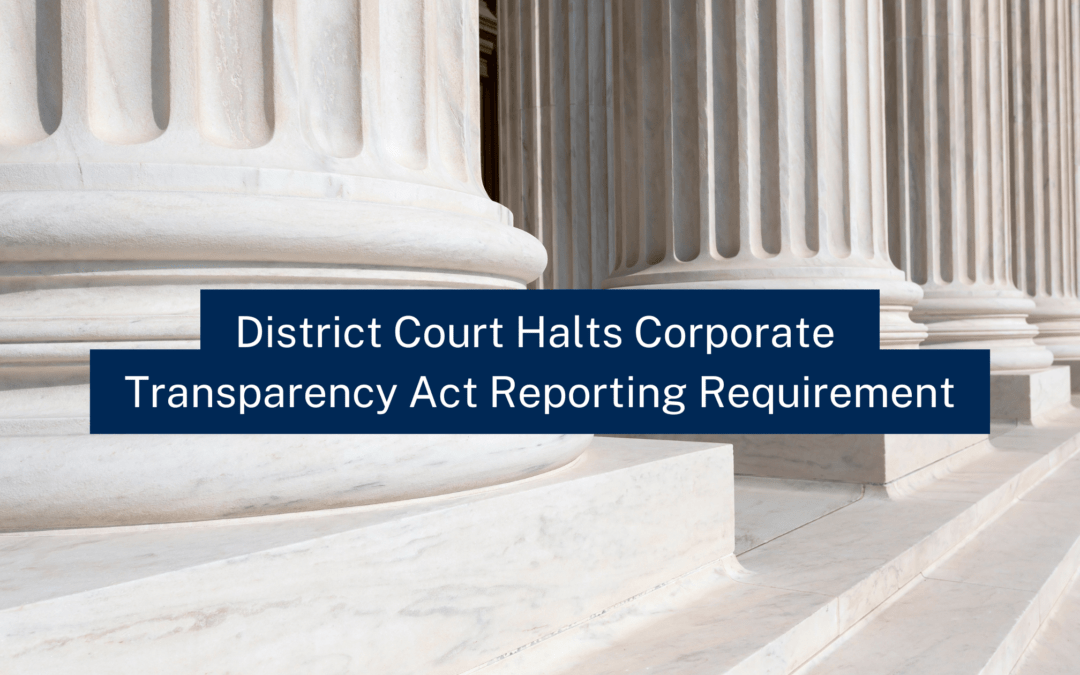DISCLAIMER: THE INFORMATION CONTAINED HEREIN IS SOLELY FOR EDUCATIONAL PURPOSES. IT IS NOT LEGAL ADVICE OR LEGAL AUTHORITY AND REPRESENTS ONLY THE AUTHOR’S INTERPRETATION OF THE CORPORATE TRANSPARENCY ACT.
The Corporate Transparency Act (CTA), a landmark piece of legislation aimed at combating financial crimes like money laundering, recently faced a significant legal challenge. A federal district court ruling has temporarily halted the enforcement of the Beneficial Ownership Information Reporting (BOIR) requirements, raising questions about its implementation and broader implications for businesses.
Background on the CTA
The CTA was introduced to enhance corporate transparency by mandating certain entities to report detailed ownership information to the Financial Crimes Enforcement Network (FinCEN). This regulation targets shell companies often used to obscure illegal activities. Businesses subject to the CTA were initially required to submit their Beneficial Ownership Information Reports (BOIR) by January 1, 2025.
The Recent Court Ruling
On December 3, 2024, the U.S. District Court of the Eastern District of Texas, Sherman Division, issued a ruling granting a nationwide preliminary injunction against the CTA. Said injunction prevents enforcement of the CTA, to include the January 1, 2025 reporting deadline. The ruling states that the CTA is “likely unconstitutional”. This ruling reflects the complexity of balancing regulatory oversight with the rights of small business owners.
Key Legal Implications for Businesses
- Regulatory Uncertainty
Businesses must navigate a murky regulatory landscape as the CTA’s implementation is delayed. The halt in enforcement does not eliminate the possibility of future compliance requirements but underscores the need for companies to stay informed. - Potential for Future Challenges
The ruling opens the door for further legal scrutiny of the CTA. Questions about privacy, administrative overreach, and compliance costs could influence the law’s trajectory. - Preparation is Still Key
While the decision to proceed with filing the BOIR for your entity now is at your discretion, it is in the best interest of any reporting company to be prepared to file the BOIR at any time. It is important to understand that while the consequences associated with failing to meet the January 1, 2025 filing deadline have been mitigated for the time being, there remains a possibility that those consequences could return to full force and effect if the ruling is overturned in the future.
What’s Next?
While the legal battle surrounding the CTA continues, businesses should monitor developments closely. The United States Department of Treasury is appealing the decision. The Financial Crimes Enforcement Network (FinCEN) has stated that entities are not currently required to file a BOIR and are not currently subject to liability if they fail to do so while the ruling remains in effect, but that the website is still accepting BOIRs for entities that wish to file one.
For those unsure about their obligations, consulting with legal and tax advisors is critical.
Conclusion
The CTA aims to curb illicit financial activities, but its implementation has faced legal hurdles that complicate its enforcement. As businesses wait for clarity, staying informed and proactive will be essential to navigate this evolving legal landscape.
Consulting with legal counsel at Adams & Sullivan can provide guidance tailored to your specific circumstances and help ensure compliance with the law.

